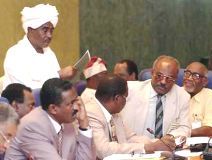Sudan foreign minister says Darfur talks not making progress
By DANIEL BALINT-KURTI, Associated Press Writer
ABUJA, Nigeria, Oct 28, 2004 (AP) — Sudan’s foreign minister said Thursday “nothing much has been achieved” at peace talks to end the crisis in Darfur so far, a view borne out by an African Union mediator’s failure to even get face-to-face discussions off the ground.

|
|
Members of Sudan’s delegation prepare for peace talks with rebels in Abuja, Nigeria October 27, 2004. |
Sudanese Foreign Minister Mustafa Osma Ismail laid the blame firmly on the rebels for failing to sign an accord which would allow humanitarian agencies unfettered access to hundreds of thousands of Darfur’s displaced.
Insistence by the two rebel groups at the talks — the Justice and Equality Movement and the Sudan Liberation Army — that they would not sign the document without an accompanying agreement on key security issues, led to the break-up of the last round of Nigeria-hosted talks in September.
“The African community is looking to Abuja” but so far “nothing much has been achieved,” Ismail told journalists after a meeting with Nigerian Foreign Minister Bola Adeniji. “The peace process needs to be enhanced.”
Ismail accused rebels of attacking civilians and aid workers in Darfur recently, and said Sudan’s armed forces were “trying their best to restrain themselves.”
Rebels accused the government of shelling the town of Allaiat in Darfur on Wednesday, killing 26 people since Tuesday. Rebels said Thursday the area was now calm.
The crisis in Sudan’s western region began in February 2003 when rebels rose up against the Arab-dominated government, claiming discrimination in the distribution of scarce resources. Pro-government militias, called Janjaweed, reacted by attacking Darfur villages.
The United Nations has called Darfur the world’s worst humanitarian crisis and said it has claimed 70,000 lives since March — mostly through disease and hunger — while 1.5 million have fled their homes since February 2003. No reliable figures are available for those killed by violence.
The Sudanese government has said the UN’s death toll is hugely exaggerated, and says the real figure is around 7,000.
“The mortality rate is within the normal rate. There is no mass killing,” Ismail said Thursday in defending his government’s record.
The peace talks stalled again on Thursday, following a pattern established since the talks started.
African Union mediators brought the two sides together in Abuja’s International Conference Centre to discuss a long-term political solution, but rebels said they needed more time to discuss the issue among themselves. The talks broke off, and are to resume Friday.
In the meantime, the African Union is working to draft a security accord between the two sides without bringing them face-to-face on the issue, said Mahgoub Hussain, spokesman for the rebel Sudan Liberation Army.
But one observer said a “word game” was threatening the security discussions.
The Sudanese government is insisting that the word “Janjaweed” be removed from the text of a draft security accord, which would call for their disarmament.
“We are demanding for the word Janjaweed to be taken off,” said Ibrahim Mohammed Ibrahim, spokesman for the Sudanese government delegation. It should be replaced by a broader reference to “outlaws or illegal factions or groups, who are not belonging to a tribe of specific area.”
Rebel groups said that, with such a description included, the security accord would seem to be calling for their own disarmament, something which they are not willing to consider at present.
On Thursday, 47 Nigerian troops left Abuja for Darfur aboard a U.S. air force transport plane, the latest batch of soldiers being deployed to bolster an African Union peacekeeping force there, said Nigerian Lt.-Col. Abubakar Rabiu.
Nigeria already has 155 troops in Darfur, and is expected to send several hundred more. The African Union force currently numbers 390 and is supposed to expand to 3,320 soldiers by the end of November.
